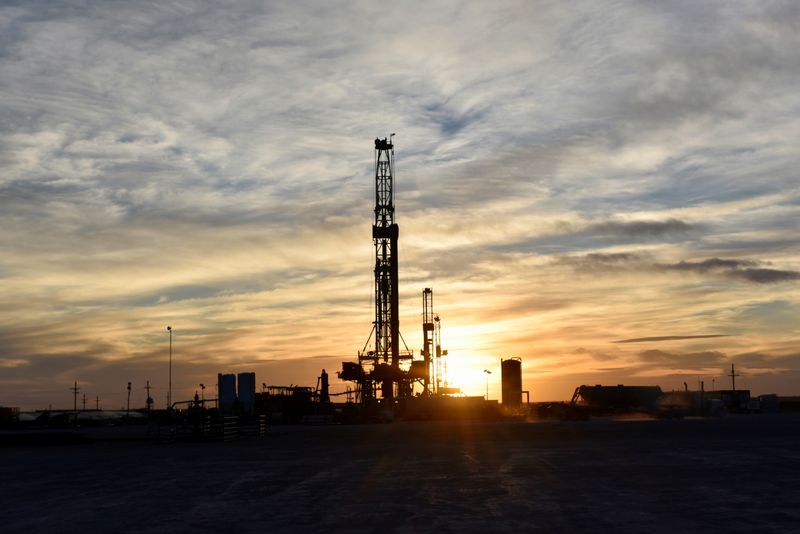By Devika Krishna Kumar and Liz Hampton
NEW YORK/DENVER (Reuters) - Oil prices have plunged so much that even U.S. shale producers who have paid for the industry's version of income insurance must deal with big holes in their budgets.
Crude oil prices have crashed about 50% this year, hit by the coronavirus outbreak and the surprise price war that erupted last weekend between Saudi Arabia and Russia. The U.S. crude benchmark on Thursday closed at $31.50 a barrel, far below the $50-per-barrel price where many companies hedged.
With prices at three-year lows, shale producers also are exposed because they used options in such a way that their insurance erodes the more oil declines.
"U.S. production is likely less well hedged than the market realizes," said Michael Tran, managing director of energy strategy at RBC Capital Markets in New York.
(Graphic link https://fingfx.thomsonreuters.com/gfx/editorcharts/GLOBAL-OIL-SHALE/0H001R8G6CB7/eikon.png )
Shale companies protect their revenues with hedges because oil prices can swing wildly due to unforeseen events. About 43% of 2020's oil production was hedged as of the end of the fourth quarter, according to Goldman Sachs (NYSE:GS).
But that 43 percent is not fully covered. Producers use a variety of methods to hedge production. The simplest is to purchase a put option that allows the holder to sell at a fixed price at a particular time, regardless of where oil prices are trading. That locks in a selling price of, say, $50 a barrel.
Many shale producers used a more complex strategy, known as three-way collars. Producers still buy the put options as insurance, but they also sell other put options, often with a lower price point - to lower or eliminate the cost of their insurance.
Effectively, this is a calculated bet that oil will fall to a certain level and no further. But that was not what happened.
"Using many of these structures, producers are price-protected unless prices fall below a certain threshold, and $45 a barrel was a popular strike level, at which point producers become fully exposed," Tran said.
RBC Capital Markets equity analysts said Marathon Oil (N:MRO) hedged about 38% and Pioneer Natural Resources (N:PXD) 54% of estimated 2020 production, using three-way collars.
Marathon and Pioneer did not respond to requests for comment.
Marathon was one of numerous companies this week that announced drastic spending cuts.
Futures and options-market volumes hit a record on Monday, CME Group (NASDAQ:CME) said. Some shale companies are looking to unwind hedges, selling the financial contracts to generate cash, market sources said, adding that others are looking to restructure their hedge positions to secure protection at lower price levels.
Occidental (NYSE:OXY) Petroleum constructed a complicated hedge that protected their selling price for 2020 down to $45 per barrel Brent while leaving them fully exposed to downside in 2021, according to company filings. That company cut its dividend by 86% this week and said it would slash spending.
"The whole industry is not evenly hedged," said Trisha Curtis, co-founder of Denver-based consultancy PetroNerds. She said hedged operators may still need to cut back on rigs and hydraulic fracturing fleets that produce oil and gas from shale rock.
Parsley Energy said on Friday it has been restructuring some of its 2020 hedge positions to provide additional protection against lower oil prices by reducing certain short put prices. Parsley said it has also "moved aggressively to protect its 2021 cash flow by adding swap positions." The company also asked its service providers to cut their prices, a move numerous companies are taking, sources said.
However, it costs much more for oil and gas producers to hedge now than it did five years ago, and they must do it at a lower absolute price, said Basil Karampelas, managing director at advisory firm SierraConstellation Partners.
"They're in a low price, high volatility quadrant where it's the square of death."
UNHEDGED
Some firms were not hedged at all, including Apache (N:APA) and Continental Resources (N:CLR), according to the latest annual filings.
"Apache's approach in response to oil price dislocations has been to quickly adjust our activity and spending as appropriate, and that is what we are doing now," said Gary Clark, vice president of investor relations at Apache, in a statement.
Continental did not respond to a request for comment.
Shale firms are only now starting to hedge for 2021. Goldman Sachs said just 2% of production for 2021 has been hedged, and now companies face the likelihood that they will not be able to lock in prices that will guarantee profits given their costs.
Most shale companies need prices above $40 per barrel to break even on costs at the well. Prices are far below that level now.

"Our clients are now all re-evaluating the hedges they have," Steve Sinos, vice president of Mercatus Energy Advisors.